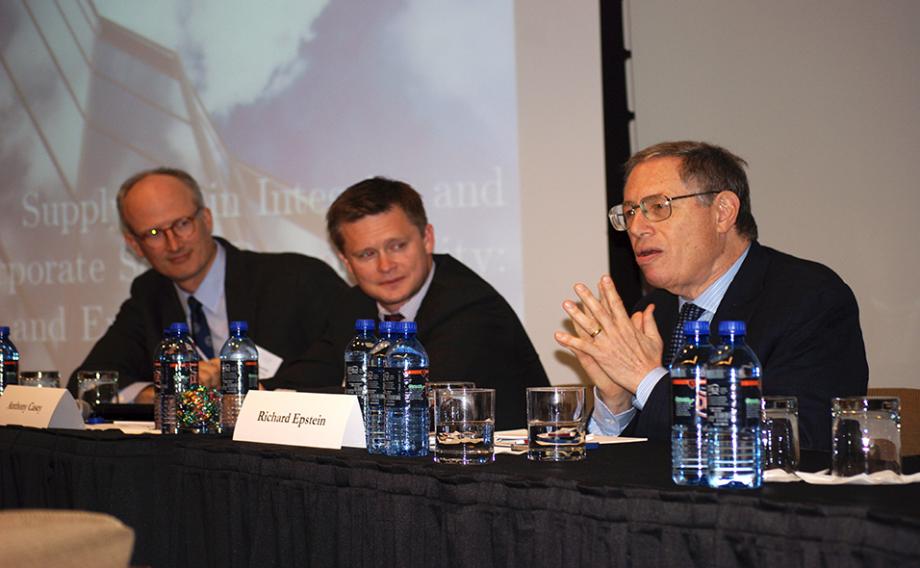Corporate Lab Convenes Top Experts on Corporate Social Responsibility

Advancing an issue that has attracted growing public and political scrutiny, the Law School’s Corporate Lab convened some of the nation’s top experts in a day-long conference on the economic, legal, and practical impact of corporate social responsibility.
About 40 people—including faculty from the Law School and the Booth School of Business, Corporate Lab students, prosecutors, corporate defense attorneys, consultants, and a federal judge—attended the closed sessions on September 18 at the Gleacher Center to explore topics ranging from the complexities of eliminating human trafficking, child labor, and inhumane working conditions from overseas supply chains to the business case for social responsibility to compliance with new laws.
“Feedback from participants has been extremely positive,” said David Zarfes, the Corporate Lab’s director and a clinical law professor. “We're only starting to see the regulatory reach of corporate social responsibility and the legal issues that surround this reach. My sense is that CSR, particularly as it concerns the supply chain, is today where the Foreign Corrupt Practices Act was in the late 1970s. Through this conference, in our own small way, we hope to have helped shape the developing CSR landscape.”
The issue is one of rising urgency, with increased globalization making supply-chain issues more relevant, and complicated, than ever.
“The modern firm we see doesn’t look like Henry Ford’s River Rouge plant where they had tires and steel and everything made on one site as one firm,” said M. Todd Henderson, Michael J. Marks Professor of Law, while facilitating a discussion that applied a law-and-economics perspective to the issue. “When it is one firm, it’s easy for the government to come in and regulate and just say, ‘You can’t do this, and it’s all right here and we can see it.’ And it’s easy for Henry Ford to just sit at his desk and say, ‘OK, stop doing this thing that is bad for society.’ In the modern firm, where it’s all spread out and globalized, it is a lot harder, and the possibility of externalizing social costs is much higher.”
What’s more, recent laws—including an executive order that requires U.S. government contractors to ensure that their supply chains are free from trafficking and a California act requiring thousands of manufacturers and retailers to publicly disclose their efforts to eradicate trafficking, child labor, and other social ills from their worldwide supply chains—means many companies must find ways to address these issues.
“It’s something that is front of mind in politics and for consumers, and it’s a place where companies are wrestling with a complex regulatory regime,” Henderson said during a break. “For our Corporate Lab students, today is an opportunity to see how some of the things they see in the news, as well as their high-minded idealism, butt up against the practical realities.”
The complexities of how to most efficiently and effectively address serious social concerns in overseas supply chains—via the market, duties imposed on directors, or through regulations—was highlighted in the particularly animated law-and-economics debate among Henderson, Professor Anthony Casey and James Parker Hall Distinguished Service Professor Emeritus of Law Richard Epstein.
Epstein argued against corporate social responsibility regulations, noting, among other things, that a desired outcome isn’t always the one produced and that supply-chain integrity is difficult to oversee and enforce. Ideally, that should be left to the local governments overseas, he said.
Casey, however, questioned whether that was realistic.
“How are you going to affect the local government if not through the supply chain?” he said. Earlier, he’d said that although market was the “starting point,” it wasn’t yet enough on its own to accomplish the social responsibility objectives.
Corporate Lab—which was founded in 2009 by Zarfes and Lecturer in Law Sean Z. Kramer, a former corporate attorney at Kirkland & Ellis and now an analyst at Gerchen Keller Capital—provides students with real-world experience and teaches the “building blocks” of corporate law. It also hosts conferences, speaker series, and an annual Transactional Challenge student competition. Students had a role in planning the September 18 conference, and three in particular—Justin Mercurio, David Birnbaum and Daniel Sito, all ‘15—were invited to make a lunchtime presentation examining a new corporate social responsibility law enacted in India.
"It was a truly unique experience to be able to attend a conference with some of the leading practitioners and theorists in the CSR field, and then, in addition, to be able to add something to the conversation as a panelist,” Sito said. “Having the opportunity to take part in a ground-floor discussion of corporate social responsibility from both a theoretical and a practical perspective will have lasting value, as CSR issues will only become more pressing as our class enters the legal workforce."
Added Mercurio: “It was a tremendous experience to be able to learn from and present in front of the most brilliant legal minds on the subject. This level of practical experience and responsibility is something that I feel is unique to the Corporate Lab.”